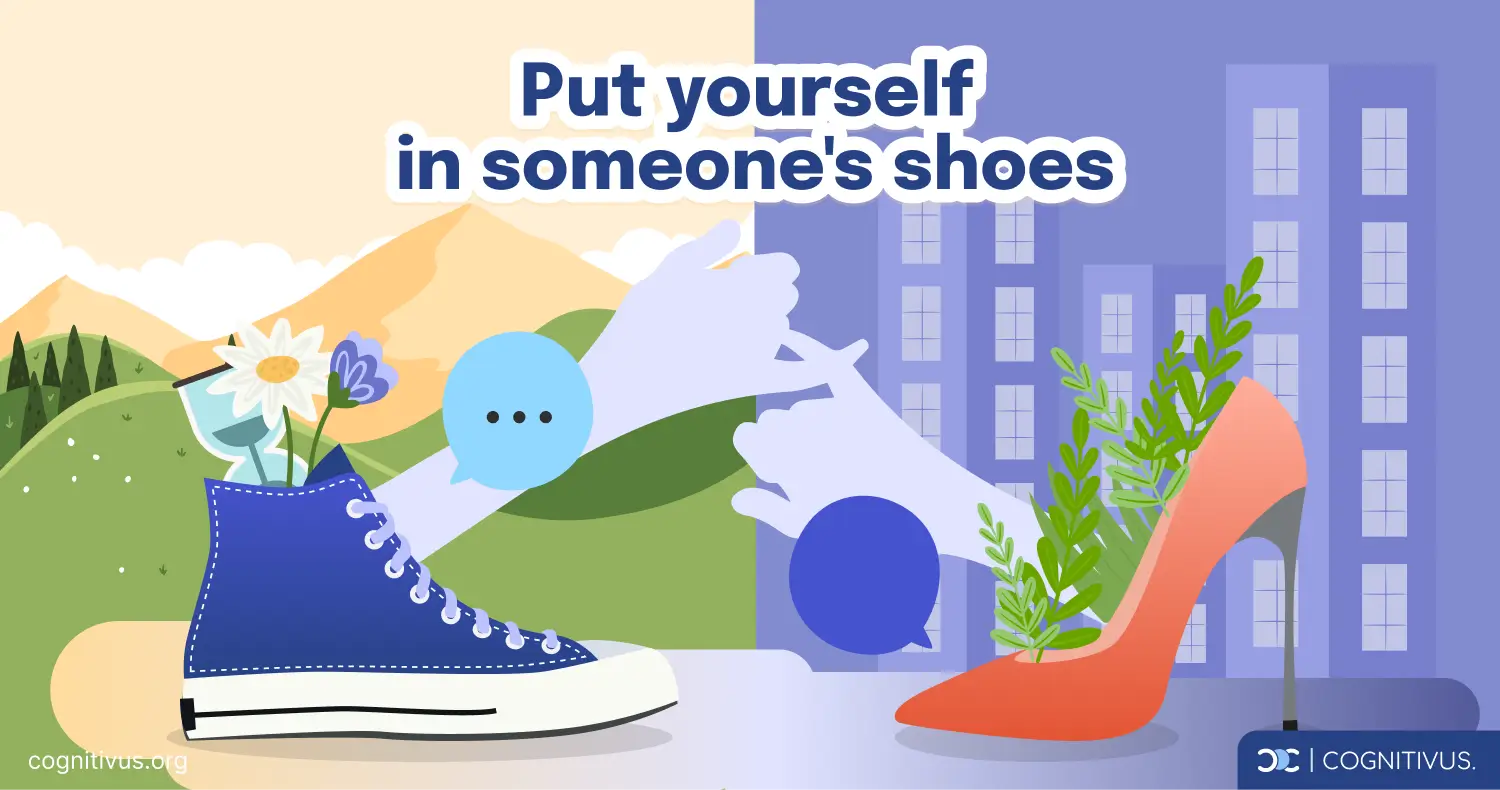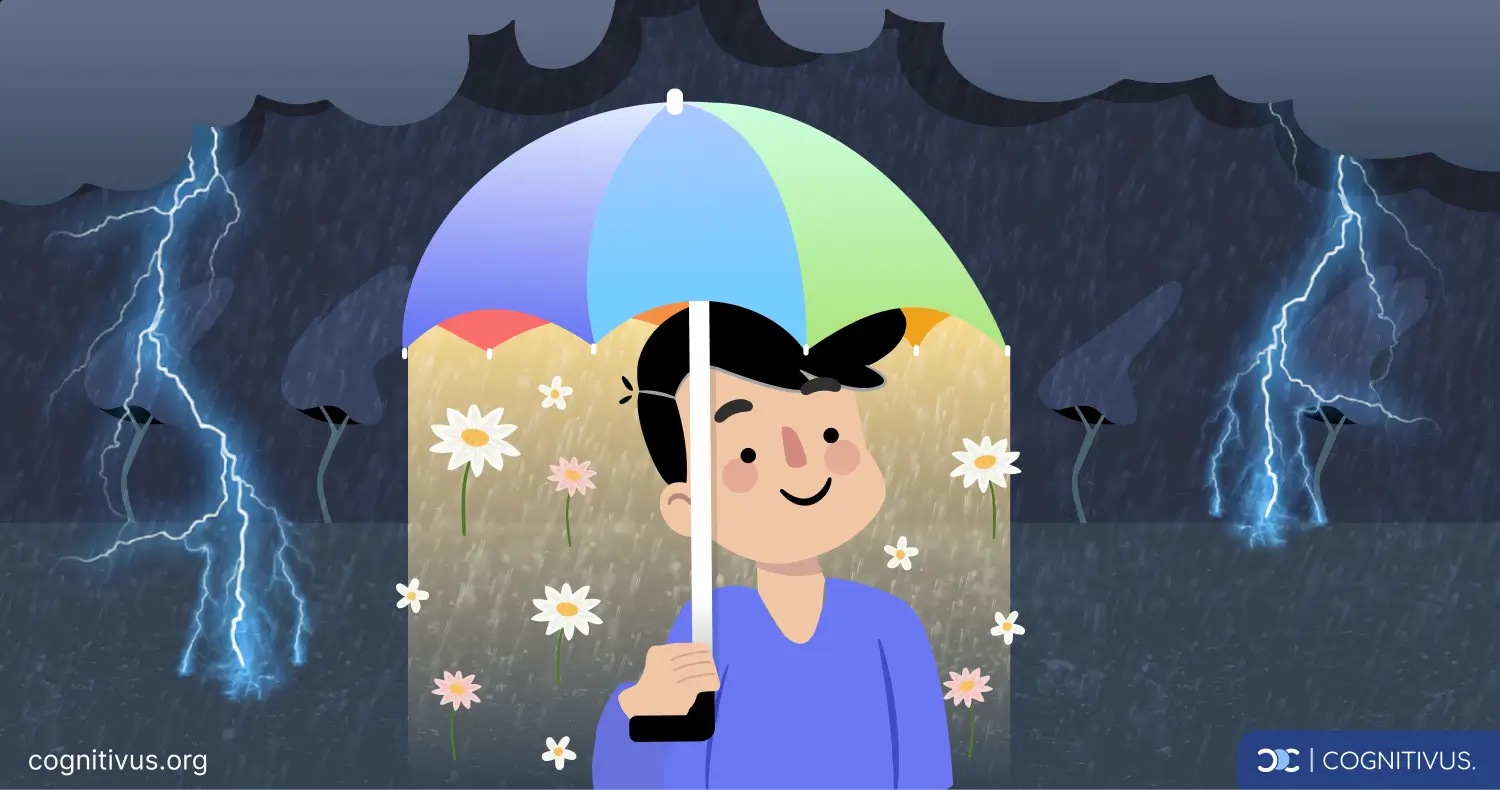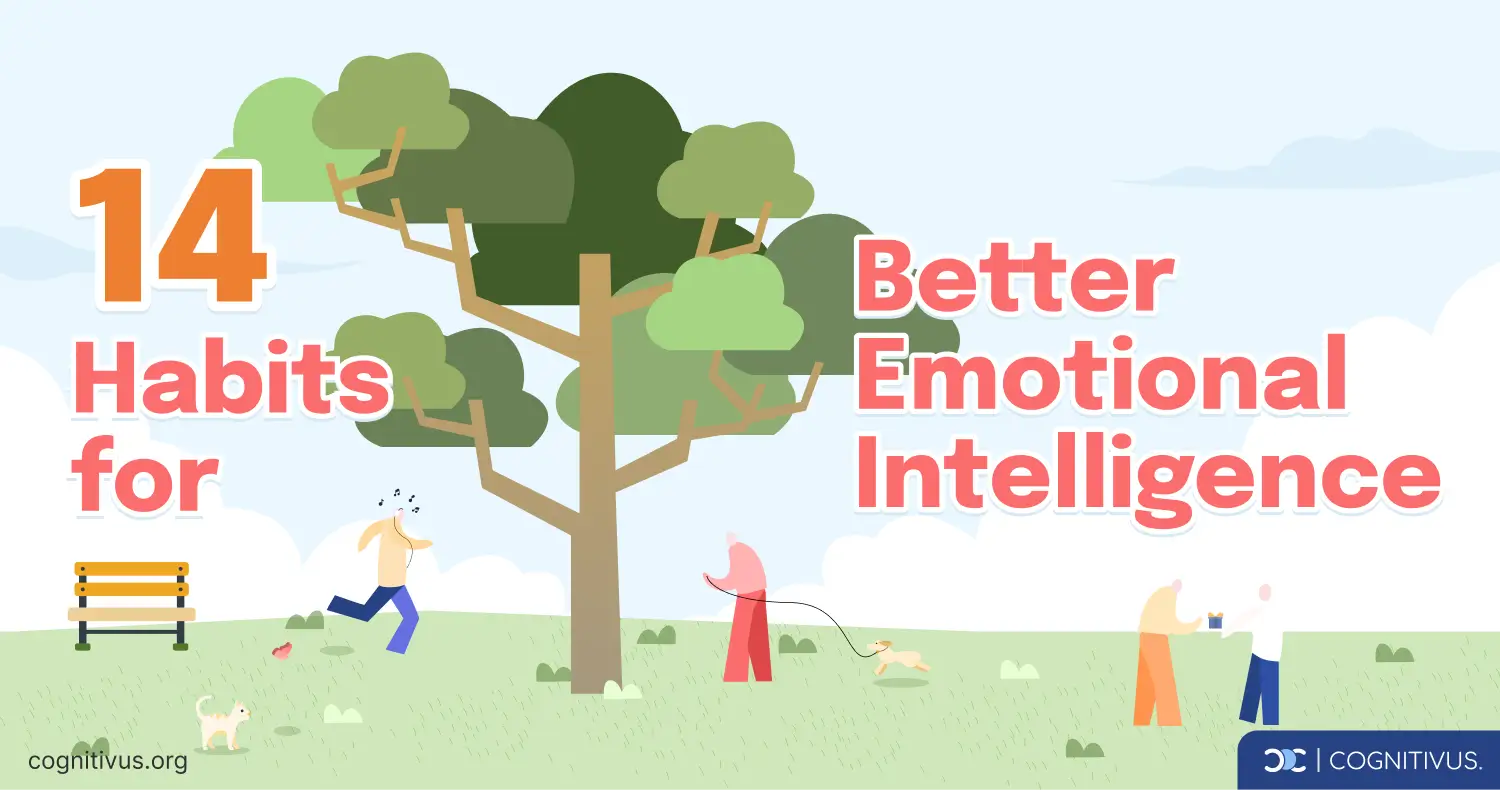Back in 1990, Peter Salovey and John Mayer came up with a concept that radically changed how we see the way people get along: Emotional Intelligence.
They referred to Emotional Intelligence as the ability to spot, understand, and handle your own feelings and the feelings of others to make better choices and lead your lives in a good direction.
This concept lies at the heart of how you connect with others, share what you're thinking, and work through the tricky challenges life throws at you.
Emotional intelligence is at the core of how you experience everything. It plays into every conversation you have, every decision you make, and every relationship you build. Whether you're at home or at work, its impact is huge.
Reflecting on Salovey and Mayer's insights, it becomes evident that emotional intelligence is crucial for understanding oneself better, enriching personal relationships, and advancing in life.
There are a few transformative habits that really make a difference to your level of Emotional Intelligence, also called Emotional Quotient or EQ. When you weave them into your day-to-day life, they can really ramp up your emotional smarts. Let’s go through them.
Self-Awareness
Understanding how your actions impact both you and those around you is an essential skill. This is the purpose of self-awareness, a key component of emotional intelligence.
Research by Dr. Tasha Eurich highlights the complexity of self-awareness, emphasizing that it entails more than introspection but also involves viewing oneself from another's perspective.
Dr. Eurich identifies two critical components of self-awareness: an internal component, which involves acknowledging your own emotions, and an external component, which is about understanding how others perceive you.
Achieving a balance between how you see yourself and how others see you might seem straightforward. In reality, this balance is rare and profoundly influences success in life and relationships.
Consider Alex, a project manager leading a high-stress project. Initially, Alex pushes the team hard to meet tight deadlines, thinking it's the best way to achieve success. However, the team becomes overwhelmed, and morale drops. Realizing something needs to change, Alex reflects on personal anxiety about deadlines and decides to seek the team's perspective on the management style.
Discovering that the team feels pressured and stressed, Alex adjusts by setting more realistic deadlines and encouraging open communication. This change, stemming from a balance of internal self-awareness (acknowledging personal anxiety) and external self-awareness (understanding the team's perception), transforms Alex into a more empathetic leader. The result is a boost in team morale and productivity, showing the impactful role of self-awareness in improving leadership and teamwork.
Self-Regulation
A key lesson we should all learn is the importance of managing our emotions, especially during times of stress and challenges. Why? Because it helps us prevent fleeting emotions from dictating our decisions.
Improving your emotional control begins with identifying what exactly triggers your strong reactions in challenging situations. Understanding your emotional triggers is like having a map to navigate your feelings, allowing you the space to choose how you want to respond rather than simply reacting on impulse.
Simple strategies can be remarkably effective in managing stress. Taking a moment to breathe deeply, stepping out for a brief walk, or having a chat with a colleague can offer you the pause needed to approach situations with a clearer mind and a calmer heart.
Additionally, shifting your perspective on mistakes can have a profound impact. Viewing errors as opportunities for learning, rather than as failures, transforms difficult moments into chances for personal and professional growth. This level of resilience is measured by the adversity quotient.
Mary faced a sudden deadline at work, sparking stress and frustration. Instead of panicking, Jamie identified the trigger and took a brief walk to clear her mind. This pause helped Mary approach the task more calmly and methodically.
When a setback occurred later, Mary viewed it as a learning opportunity rather than a failure, analyzing the mistake to prevent future issues. Mary’s actions show how understanding triggers, taking breaks, and reframing mistakes can enhance emotional control and turn challenges into growth opportunities.
In addition to helping you navigate through tough times, this approach will also help you face future challenges with more deliberation and less distress.
Active listening
The art of active listening is a fundamental component of emotional intelligence. It’s a skill that goes beyond hearing the words someone is saying. It requires truly perceiving the person behind those words, understanding their perspective, emotions, and the unspoken messages they're communicating.
When you listen to understand rather than merely waiting for your turn to speak, you're building a bridge to genuine connection and mutual respect. This approach has the power to transform relationships, and create an environment where understanding and empathy flourish.
Let’s not forget that active listening also includes tuning into the non-verbal ones such as body language, tone of voice, and those subtle signals that convey so much more than words alone. This level of engagement shows that you value not only the message but the person sharing it with you.
During lunch, you meet a friend who's visibly upset about a recent job rejection. Instead of immediately offering solutions or sharing a similar experience of your own, you give your full attention. You notice the frustration in their voice, the disappointment in their eyes, and the way they slump forward, feeling defeated. As they speak, you nod in understanding, interject with "I see" or "That sounds really tough" at appropriate moments, and maintain eye contact to convey your engagement.
After they've finished sharing, you gently rephrase their main points, saying, "It sounds like you put a lot into this opportunity, and it's really disheartening to not see it pan out." This ensures you've correctly understood their feelings and situation. By doing this, you're practicing active listening – valuing not just the content of what your friend has said but also acknowledging their feelings and offering them the respect and empathy they need at that moment.
In my experience, it's crucial to separate emotions from the facts at hand. Your emotions, while valid, can sometimes cloud your judgment, leading you to make decisions based on how you feel rather than what the situation objectively requires. Recognizing this distinction helps in minimizing emotional biases, ensuring that your decisions are fair and grounded. This balance between emotional understanding and objective analysis is what makes active listening a cornerstone of effective emotional intelligence.
Building Strong Relationships
The ability to build and maintain strong relationships is a common sign of high emotional intelligence. Strong relationships require a deeper level of connection than superficial interactions.
This is where both understanding and empathy come into play.
Understanding others involves trying to see situations from someone else's point of view, feeling what they're feeling, and truly grasping where they are coming from. It’s akin to an art form. This kind of deep understanding is what makes relationships stick and helps smooth over conflicts when they pop up.

Empathy, a crucial part of emotional intelligence, makes your talks and time together richer and more impactful. It goes beyond nodding along when someone shares their feelings; it entails diving in, really connecting with and reacting to what they're going through. After listening, the next step involves using social skills, which are like building blocks for stronger relationships based on empathy.
Imagine attending a community meeting with high tensions due to recent policy changes. Rather than escalating the debate, you focus on using your relationship-building skills. You listen intently to a local shop owner concerned about how the changes might affect his business. You actively engage by reflecting his concerns, saying, “It seems like these changes are quite worrying for you.”
Next, you use your social skills to keep the conversation respectful and productive. You ask clarifying questions and encourage others to share their perspectives, maintaining a calm and inclusive atmosphere.
This approach not only eases tensions but also improves understanding and community solidarity. It demonstrates the power of empathy and respect in building strong relationships.
Pursuing Growth
Pursuing growth is to view every talk, hurdle, or challenge in the road as a chance to get better and understand more.
If you are already tuned into your emotions, growing is not merely a goal; it defines your approach. You will find ways to make your everyday actions step stones towards becoming who you want to be. This way of thinking turns even the smallest moments into chances for learning and becoming stronger.
One of the hardest but most rewarding parts of this path is figuring out how to deal with criticism. Instead of getting defensive, try to understand how openly listening can transform critiques into a tool for improvement. It’s about digging through the feedback, picking out the helpful bits, and using them to shape a better me. Being open to critique shows a lot of strength, toughness, and a real commitment to being the best you can be.
People with high emotional intelligence never lose their curiosity; they are always hungry to know more and do better. Whether it's getting into the latest books, going to workshops that make you think, or getting advice from mentors.
Jane, a project manager, faced criticism from a client about her team's software design. Instead of responding defensively, she saw this as an opportunity to learn. She arranged a feedback session with the client, carefully noted their concerns, and later discussed these with her team.
Using the feedback constructively, Jane and her team improved the software's user interface and performance. The revised project was well-received, enhancing client satisfaction and demonstrating Jane’s commitment to growth and emotional intelligence.
This approach showed Jane's ability to use criticism as a tool for personal and professional development. This is how a growth mindset can transform challenges into opportunities for improvement while boosting your adversity quotient.
At the end of the day, growing through emotional intelligence means you're always learning from life. It welcomes every experience as a lesson, iming to learn, grow, and shine in everything you do.
Mindfulness
Mindfulness is living in the moment. It's this simple yet powerful way of paying attention to the present, without judging whatever you're thinking or feeling. By doing this, you get to watch your own thoughts and emotions as they happen, seeing everything more clearly as it comes and goes.
Mindfulness and strong emotional intelligence are closely intertwined. In fact, research shows how emotional intelligence increases after you practice mindfulness.
Mindfulness is not only about meditating or sitting quietly on your own – though those activities are great. It also involves being fully there in the little moments, like taking a deep breath before you go into a meeting or really noticing the flavors in your food.
Tom, a sales manager, used to feel overwhelmed before big presentations. To manage his stress, he began practicing mindfulness. Before a crucial meeting with potential clients, instead of pacing or rehearsing endlessly, Tom took five minutes to practice deep breathing. He focused solely on his breath, feeling each inhalation and exhalation, and allowed his thoughts to pass without judgment.
This simple mindfulness exercise helped him clear his mind and reduce anxiety. By the time the meeting started, Tom felt more present and composed. His improved focus and calmness not only made the presentation more effective but also helped him better read the room and respond to the clients' reactions and emotions.
Making space for these mindful moments in your daily routines can help sharpen your emotional intelligence, gradually making your lives richer and more full in all kinds of ways.
Self-Reflection
While mindfulness emphasizes living in the moment without judgment, self-reflection requires a different kind of introspection. It involves taking a step back to thoughtfully consider your feelings and actions, providing a broader perspective of your internal processes. This practice isn't about harsh self-criticism but about deeply understanding the core of your experiences.
Furthermore, self-reflection is crucial for addressing negative self-talk – those automatic thoughts that often skew towards pessimism and self-doubt. By regularly examining your thoughts, especially after emotionally charged events, you can begin to recognize patterns of irrational or harmful thinking. Once identified, you can consciously work to replace these negative thoughts with more positive, constructive ones, thereby improving your emotional resilience.

Consider pausing to reflect with questions like, "What was I thinking during that challenging conversation?" or "Why did I feel joy while talking to my friend?" Such introspection can reveal emotional patterns and responses that you might not have previously recognized, including the tendency towards negative self-talk.
Gaining these insights can be transformative. They enable you to predict how you might feel or react in future situations, which can help you manage your responses more effectively. This approach doesn't suppress your emotions but rather seeks a deeper understanding of them, leading to a more balanced and controlled emotional life. This way, self-reflection gets you closer to high emotional intelligence.
Lisa, a manager, felt frequently frustrated during team meetings when discussions became contentious. Reflecting on her reactions after a particularly heated meeting, she realized that her frustration stemmed from feeling that her contributions were overlooked and a pattern of thinking that she wasn't valued by her team. Acknowledging this negative self-talk was a critical step.
With this insight, Lisa decided to change her approach. In the next meeting, she made sure to express her ideas clearly and listen actively to her colleagues. She also worked on replacing her negative thoughts with affirmations about her value and contributions. She acknowledged others' suggestions before adding her own, which helped create a more inclusive atmosphere.
These changes not only reduced her frustration but also improved the team's dynamics and her own self-esteem.
Seeking feedback
Seeking feedback is akin to looking into a mirror that reveals aspects of yourself that might otherwise remain you might not be able to see on your own.
While it may not always be comfortable, embracing feedback, whether positive or not, is crucial for both personal and professional growth, and it’s one of the ways to get a better emotional intelligence.
Integrating feedback as a normal part of your daily interactions, based on mutual trust and respect, can propel you forward. By boosting your social intelligence, this habit also strengthens your relationships, making them deeper and more meaningful.
Maria and Alex, married for five years, often clashed over minor issues. After a heated argument about chores, they decided to openly exchange feedback. Alex mentioned that Maria's tone sometimes felt harsh, making him defensive. Maria hadn't realized this and appreciated the insight.
In return, Maria pointed out that Alex tended to avoid discussing problems until they escalated. Recognizing this, Alex agreed to address issues promptly.
This new approach to feedback helped them improve their communication, deepening their trust and respect. By embracing vulnerability and constructive criticism, they enhanced their emotional intelligence and strengthened their relationship.
Being open to vulnerability is essential; recognize that it is not a weakness but a powerful tool for personal development.
Flexibility
Emotionally intelligent people master the art of adjusting to changes and dealing with uncertainties without panic. This is what flexibility is about.
Flexibility means you are prepared to alter plans spontaneously, and you consider various perspectives whenever you are facing a problem. This attitude will help you remain composed and balanced even when unexpected difficulties arise. As a result, you will make decisions without fear of the unknown or excessive attachment to familiar methods.
Imagine you're scheduled for a major presentation with your company's stakeholders. Everything is set, but on the morning of the event, you discover that a crucial piece of your presentation technology isn't working. What do you do?
Instead of succumbing to panic, think about how you can adapt. Could you use a whiteboard and markers to illustrate your points, making the session more interactive? What about explaining the technical issue to the audience with some humor to lighten the atmosphere?
By choosing to adjust your plans on the spot and approach the situation with flexibility, you not only salvage your presentation but also enhance your reputation.
By embracing the unknown with curiosity rather than fear, you can positively influence your daily mood and the guidance you offer to others.
Motivation
Motivation is often seen as what gets you out of bed in the morning, drives you through tough times, and helps you recover from setbacks. Yet it goes beyond the mere desire to get things done. Indeed, motivation is deeply tied to your emotional self-awareness, particularly in understanding the underlying reasons for your actions.
In short, it’s about asking yourself: What are my true values? What are my life goals?
To stay motivated, it's crucial that your daily activities align with your broader aspirations. Let the values that mean the most to you guide you through both the highs and lows.
By setting goals that resonate deeply with your personal beliefs and ambitions, you are more likely to overcome challenges and transform obstacles into opportunities for learning and improvement.
Maintaining motivation is a constant effort. It requires you to constantly reflect on what you've accomplished, celebrating all successes – big and small – and keeping your long-term objectives in view.
Imagine you're working in a job that pays well but doesn't align with your personal passions or values. One day, a friend offers you a chance to join a startup that is much more in line with your interests, but with a significant pay cut. Ask yourself:
- What are my true values and life goals in this scenario?
- Would the satisfaction of working in a field I love outweigh the immediate financial security?
Reflect on how this decision aligns with your broader goals. If your motivation is strongly connected to personal fulfillment and achieving long-term goals, you might see this as an opportunity to realign your career path with your values. This can lead to greater job satisfaction and personal growth, even if it involves initial challenges.
Encouraging others
Who doesn't appreciate a little recognition? Actively pointing out the strengths in others, providing constructive feedback, and celebrating their successes can transform your relationships, both professionally and personally.
At the core of effective personal and professional interactions is the commitment to build supportive relationships. Here, support is constant, and everyone feels valued and empowered to be their best.
This is a powerful habit that creates a virtuous circle. It promotes a culture of mutual respect and appreciation and improves the overall emotional climate.
Imagine you notice a colleague who has been putting in extra effort on a project. Instead of letting their hard work go unnoticed, you take a moment to acknowledge it. You might approach them and express your appreciation for their dedication, highlighting specific aspects of their work that impressed you.
Optimism
Keep your face always toward the sunshine – and shadows will fall behind you.
– Walt Whitman
Walt Whitman beautifully illustrated the concept of optimism.
Optimism means maintaining hope and seeing opportunity in challenging circumstances. This positive outlook is essential for successfully navigating life’s ups and downs. Optimists consistently seek the best outcomes in every situation and view obstacles as opportunities for personal growth. They focus on solutions, employ positive self-talk to strengthen their mindset, and manage personal challenges effectively.

Additionally, this habit supports and uplifts others, ensuring that optimism is shared and beneficial during tough times.
Research supports this emotional intelligence habit. A study conducted on 300 students revealed a strong positive correlation between the levels of optimism and emotional intelligence among students. It concluded that maintaining an optimistic outlook can help you increase your level of emotional intelligence.
Social Awareness
Social Awareness is another habit that can help you improve your emotional intelligence by allowing you to deepen your connections with others. It is one of the core components of social intelligence.
It goes beyond the scope of active listening – which we’ve discussed earlier – by incorporating a broader understanding of environmental and interpersonal dynamics.
It’s about paying attention to the underlying emotions and dynamics in various social settings, which can differ significantly from what is being verbally communicated. This sensitivity allows you to navigate social complexities with greater competence and respond more effectively to the needs and concerns of others, often before they are explicitly stated.
Imagine you are in a team meeting where one of your colleagues seems to agree with a proposed plan, but her body language – crossed arms, minimal eye contact, and a hesitant tone – tells a different story. By noticing these subtle signs, you realize there might be unspoken objections or concerns. Instead of moving forward without addressing these potential issues, you might pause and invite further comments or questions, showing that you value genuine consensus and are responsive to the emotional atmosphere of the room.
Practice of gratitude
As our last habit for higher emotional intelligence, incorporating gratitude into your daily routine is a simple yet powerful shift in perspective. Instead of dwelling on what you lack, you begin to appreciate what you already have. This practice involves recognizing the goodness in every moment and expressing thankfulness for both significant achievements and small joys.
Reflecting on the highlights of your day or the things you're thankful for before bedtime can become a soothing ritual that enhances your mood and overall well-being.
Take a few moments each day to write things you are grateful for in a journal. This can open your eyes to the abundance of positive experiences in life. When you extend gratitude to others, whether through a simple "thank you" or an act of kindness, it not only uplifts your spirits but also strengthens your connections with them.
By embracing gratitude, you will discover the beauty in life's ordinary moments and the significance of expressing thanks, from simple pleasures that enrich your life, to major milestones that transform it.



